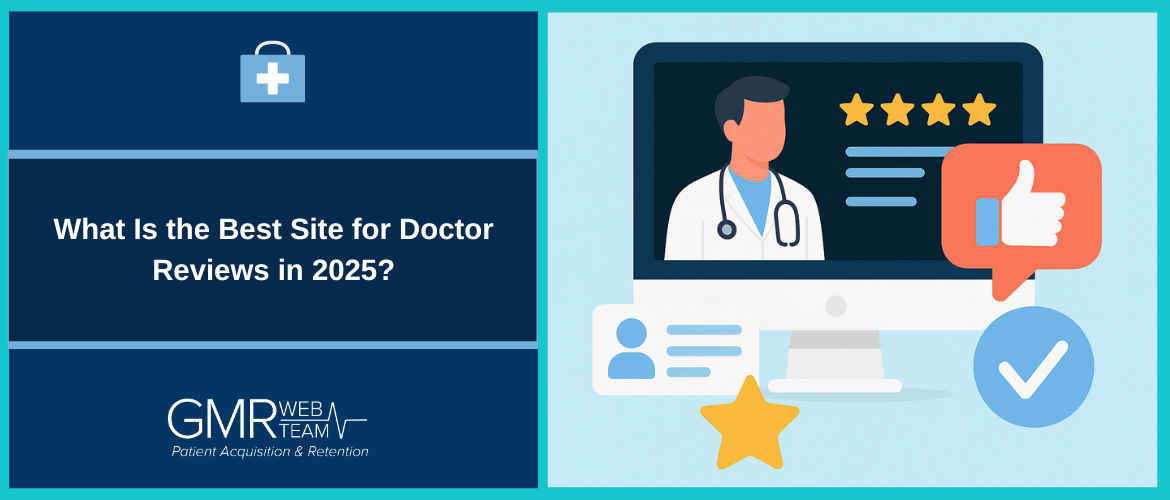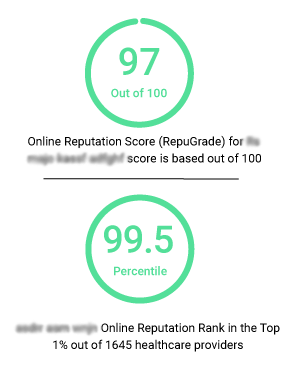What Is the Best Site for Doctor Reviews in 2025?

When people search for a new doctor, the decision rarely comes down to location or insurance coverage alone. More often than not, it's the reviews from other patients that make the difference. In fact, the RepuGen 2025 Patient Review Survey found that 73% of patients rely heavily on reviews before scheduling an appointment.
That means reviews have become the digital word of mouth in healthcare. But with so many different platforms offering reviews, one question keeps coming up: What is the best site for doctor reviews in 2025?
The survey results provide a clear picture and essential insights for both patients and providers.
Google: The Clear Leader in Doctor Reviews
According to the survey, Google is by far the most dominant platform for doctor reviews.
- 84% of patients are aware of doctors' Google reviews.
- 77% actually use Google when deciding where to go for care.
Why does Google stand out? The answer is simple: accessibility and visibility. Patients already use Google for everyday searches, from finding restaurants to checking store hours. Reviews for doctors appear instantly in Google Search results and Google Maps, making them easy to find without opening a separate site.
Another reason for Google's dominance is trust. Patients view it as a neutral platform where they can see a mix of feedback, star ratings, and even how doctors respond to reviews. For providers, this means Google reviews are no longer optional, they're essential for building credibility and attracting new patients.
Other Platforms Patients Still Rely On
Even though Google is the clear leader, the survey shows that patients don't rely on just one site. Most people check two to three review platforms before making a decision. Here's how the others stack up:
- WebMD (67% awareness): Known primarily as a trusted health information site, WebMD also hosts doctor reviews. Its reputation in the medical space makes it the second-most-used platform, especially among patients seeking a credible source.
- Healthgrades (31% awareness): This site continues to hold value thanks to its detailed doctor profiles, specialties, and hospital affiliations. Patients who want more in-depth information often check here.
- Yelp (59% awareness): While it was once a major player, its importance in healthcare reviews has been slipping. Still, some patients, especially in large cities, continue to check it.
- Facebook (52% awareness): Social media reviews have been declining in influence as patients increasingly turn to health-specific platforms.
- RateMDs (21% awareness): While smaller in scale, it is gaining traction, particularly among patients who like to cross-check multiple sources before deciding.
The pattern is clear: Google leads the way, but supporting platforms like WebMD and Healthgrades still add credibility. Practices that ignore these platforms may miss out on patients who want to validate what they've read elsewhere.
What Patients Care About Most in Doctor Reviews?
Reviews aren't just about star ratings. Patients read between the lines and pay attention to certain qualities that help them make confident decisions:
- Freshness matters: About 40% of patients consider reviews older than 1–2 years outdated. If your last review was from 2021, many patients won't find it relevant anymore.
- Credibility through volume: A single glowing review isn't enough. Patients want to see at least 6–10 reviews to believe they represent real patient experiences.
- Ratings and thresholds: Star ratings still matter a lot. The survey found that 70% of patients expect a 4-star rating or higher before they'll even consider booking. Anything lower often drives them to keep searching.
- Provider engagement: Reviews aren't just about what patients say. 59% of patients said they trust providers more when they respond to reviews. Even a short thank-you to a positive review, or a polite, professional reply to a negative one, goes a long way in building trust.
These insights show that reviews aren't just a passive reflection of patient satisfaction. They're a powerful communication tool that can shape how potential patients view a practice.
So, What Is the Best Site for Doctor Reviews?
Based on the 2025 RepuGen Patient Review Survey, the answer is clear:
- Google is the best site for doctor reviews. Its reach, visibility, and convenience make it the first stop for most patients.
- WebMD and Healthgrades serve as important supporting platforms, offering extra credibility and detailed information.
- Other platforms like Yelp, Facebook, and RateMDs play a more minor but still relevant role, particularly for patients who prefer to cross-check.
The key takeaway is that patients rarely rely on just one platform. They look for a consistent presence across multiple sites. For doctors and practices, that means building a strong Google profile and maintaining visibility on WebMD, Healthgrades, and at least one other platform.
The Power of Patient Reviews in 2025 with GMR Web Team
In 2025, reviews are more than just feedback, they're a critical part of patient decision-making. Google clearly leads the pack, but patients are thorough and want confirmation from multiple sources.
For healthcare providers, the strategy is straightforward:
- Keep reviews fresh and consistent.
- Aim for high ratings by delivering excellent care and a positive patient experience.
- Respond to reviews to show patients you're listening.
- Maintain visibility across multiple platforms.
By doing so, practices can build trust, attract new patients, and strengthen their reputation in a highly competitive healthcare landscape. At GMR Web Team, we are here to help healthcare providers navigate the world of online reviews and enhance their digital presence.
Contact us today to get started!
Be the first to post a comment



Thanks For Comment